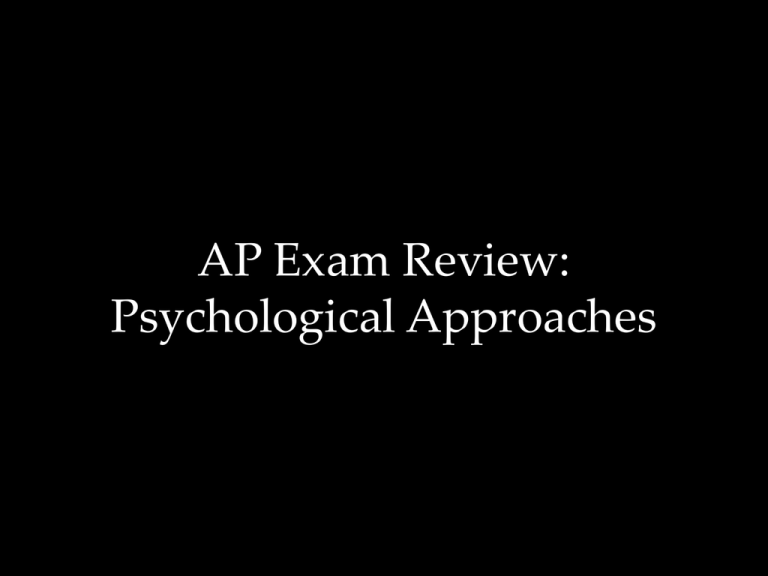Psychological Science Develops
advertisement

AP Exam Review: Psychological Approaches Psychological Science is Born Wundt (1832-1920) Wundt (1832-1920) Titchner (1867-1927) Wilhelm Wundt and psychology’s first graduate students studied the “atoms of the mind” by conducting experiments at Leipzig, Germany, in 1879. This work is considered the birth of psychology as we know it today. Wundt’s student, Edward Titchner, introduced structuralism at Cornell University. He wanted to discover the structural elements of the mind, so he trained people in introspection (looking inward) and reporting elements of their experiences. Generally speaking, the structuralists focused on inner sensations, images and feelings. Psychological Science is Born American philosopher William James looked at the evolved functions of our thoughts and feelings. James (1842-1910) Mary Whiton Calkins and William James Mary Calkins Margaret Floy Washburn James believed that thinking, like smelling and seeing, developed because it was adaptive. He studied how mental and behavioral processes function and enable us to adapt, survive, and flourish. This approach to psychology is called functionalism. James was better known for teaching at Harvard and for writing Principles of Psychology (1890), the first psychology textbook, a task that took him 12 years to complete. Mary Calkins, James’s student, became the APA’s first female president. Margaret Floy Washburn was the first female psychology Ph.D., the second female APA president, and a distinguished writer (The Animal Mind) Psychological Science Develops Those involved in the birth of psychology, dubbed “Magellans of the mind,” developed from more established fields. Many, like Wundt, were physiologists. Sigmund Freud (1856-1939) Sigmund Freud, an Austrian physician, and his followers emphasized the importance of the unconscious mind and its effects on human behavior. This approach is known as psychoanalysis. Psychology originated in many disciplines and countries. It was, until the 1920s, defined as the science of mental life. Psychological Science Develops Behaviorists Watson and later Skinner dismissed introspection and redefined psychology as “the scientific study of observable behavior” from the 1920s through the 1960s. The behaviorists emphasized the study of overt behavior as the subject matter of scientific psychology. Both Watson and Skinner were influenced by classical conditioning which was discovered by Ivan Pavlov. Like the behaviorists, Pavlov had a distain for “mentalistic concepts” such as consciousness. Ivan Pavlov John Watson (1878-1958) (1849 – 1936) B.F. Skinner (1904-1990) Psychological Science Develops Humanistic Psychology The humanists thought behaviorism’s focus on learned behaviors was too mechanistic and that psychoanalysis focused too much on the meaning of childhood memories. http://www.carlrogers.dk http://facultyweb.cortland.edu Abraham Maslow Maslow and Rogers emphasized current environmental influences on our growth potential and our need for love and acceptance. Carl Rogers (1902-1987) Psychological Science Develops The Cognitive Revolution In the 1960s, psychology went through a cognitive revolution where the focus returned to earlier ideas like the importance of how our mind processes and retains information. The new definition of psychology from this revolution was “the science of behavior (what we do) and mental processes (inner thoughts and feelings).” This revolution has continued to evolve (with technology) into multiple fields including cognitive neuroscience (the study of brain activity linked with mental activity). Psychology’s Three Main Levels of Analysis Today, psychology is analyzed using the biopsychosocial approach. Each of psychology’s perspectives is helpful, but each by itself fails to reveal the whole picture. Psychology’s Current Perspectives Perspective Focus Sample Questions Neuroscience How the body and brain enables emotions? How are messages transmitted in the body? How is blood chemistry linked with moods and motives? Evolutionary How the natural selection of traits the promotes the perpetuation of one’s genes? How does evolution influence behavior tendencies? Behavior genetics How much our genes and our environments influence our individual differences? To what extent are psychological traits such as intelligence, personality, sexual orientation, and vulnerability to depression attributable to our genes? To our environment? Psychology’s Current Perspectives Perspective Focus Sample Questions Psychodynamic How behavior springs from unconscious drives and conflicts? How can someone’s personality traits and disorders be explained in terms of sexual and aggressive drives or as disguised effects of unfulfilled wishes and childhood traumas? Behavioral How we learn observable responses? How do we learn to fear particular objects or situations? What is the most effective way to alter our behavior, say to lose weight or quit smoking? Psychology’s Current Perspectives Perspective Focus Sample Questions Cognitive How we encode, process, store and retrieve information? How do we use information in remembering? Reasoning? Problem solving? Social-cultural How behavior and thinking vary across situations and cultures? How are we — as Africans, Asians, Australians or North Americans – alike as members of human family? As products of different environmental contexts, how do we differ? Psychology’s Subfields: Research Psychologist Biological Developmental Cognitive Personality Social What she does Explore the links between brain and mind. Study changing abilities from womb to tomb. Study how we perceive, think, and solve problems. Investigate our persistent traits. Explore how we view and affect one another. Psychology’s Subfields: Research Other 11.5% Experimental 14.1% Biological 9.9% Developmental 24.6% Psychometrics 5.5% Cognitive 8.0% Social 21.6% Data: APA 1997 Personality 4.8% Psychology’s Subfields: Applied Psychologist Clinical What she does Studies, assesses, and treats people with psychological disorders Counseling Helps people cope with academic, vocational, and marital challenges. Educational Studies and helps individuals in school and educational settings Industrial/ Organizational Studies and advises on behavior in the workplace. Psychology’s Subfields: Applied Industrial 6% Educational 9% Other 3% Counseling 15% Data: APA 1997 Clinical 67% Clinical Psychology vs. Psychiatry A clinical psychologist (Ph.D.) studies, assesses, and treats troubled people with psychotherapy. Psychiatrists on the other hand are medical professionals (M.D.) who use treatments like drugs and psychotherapy to treat psychologically diseased patients.




